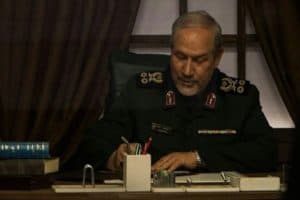
Major General Yahya Rahim Safavi, senior advisor to the supreme leader and former commander of the IRGC.
A top Islamic Revolutionary Guard Corps (IRGC) commander told Iranian media last week that the Guard and allies supply intelligence to Russia for airstrikes in Syria. Major General Yahya Rahim Safavi, who is senior advisor to the supreme leader and was IRGC chief commander from 1997 through 2007, made the remarks in a lengthy television interview on Sept. 22.
“The Russians are responsible for aerial support of ground units, meaning those who are fighting on the ground are the Syrian army, Syrian popular forces, and some advisory forces and/or Hezbollah forces. Russia largely plays the role of supporting these [forces] by air,” Safavi said.
“Many victories like the capture of Aleppo would not have been possible without movement on the ground and only with air support,” Safavi continued. “The Russian air support was of course effective, but the ground forces gave them the intelligence that, for example, [told them] which terrorists were in what area.”
There is a kernel of truth to these statements. The IRGC-led Shiite expeditionary forces, which are comprised of IRGC proxies from Iraq, Lebanon, Afghanistan and Pakistan, were instrumental in the encircling of the rebel-held eastern Aleppo city in late July, and the reimposition of the siege in early September after the coalition of Islamists, Salafists, and rebels broke the initial siege in early August. A relentless and intense Russian bombing campaign has been a crucial factor in the successes of the pro-regime coalition. [See LWJ report, Soleimani’s presence in Aleppo underscores strategy of crushing rebels.]
Safavi, however, overplays the role that the Syrian Arab Army and the IRGC-backed Syrian National Defense Forces, a pro-regime militia, have played in the recent battles for Aleppo in order to bury the extent to which Assad relies on foreign patrons as foot soldiers and planners in arguably the most important battle of the civil war yet.
The ground forces in Aleppo have been primarily led by Iranian military officers in coordination Russian and Syrian officers. The deaths of senior IRGC commanders attest to their involvement.
Safavi says that units under the supervision of IRGC or Hezbollah operatives, which have had a more active presence in Syria in recent years, conduct on-the-ground intelligence collection. The main planning and target selection would be coordinated between the Iranians, Russians, and Syrians. The first two may take the lead.
Based on Safavi’s statements, collection for Russian sorties elsewhere in which Syrian forces have more presence may fall on them, under the direction of Russian officers.
The strategic command headquarters that oversees all operations includes Russians, Iranians, Syrians, and IRGC-backed proxy commanders. There is lingering tension and mistrust in this alliance, particularly between the Iranians and Russians. For now, at least, they share intelligence towards the common objective of achieving military victory in Aleppo.
Are you a dedicated reader of FDD's Long War Journal? Has our research benefitted you or your team over the years? Support our independent reporting and analysis today by considering a one-time or monthly donation. Thanks for reading! You can make a tax-deductible donation here.








1 Comment
I fail to see the relevance or logic of this article, I would have thought everyone would assume that was the case without being told, unless the purpose of the revelation is to be-little the contribution of the SAA in some all way, the best thing to do is to hold an election, ASAP.